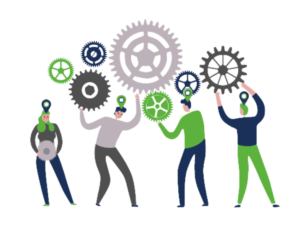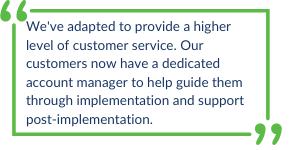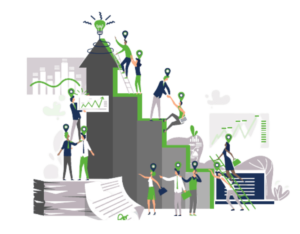Categories
Have the challenges of the past year left you feeling overwhelmed? Exhausted? You’re not alone. It’s time to reset, recalibrate and focus on the future!
Recently, Yukon Palmer sat down for a webinar with our integration partner, Key2Act, sharing insights into what he’s learned from FieldLogix customers over the last ultra-challenging year. He shares a fresh perspective on how you can make the most of what you still have while finding hidden opportunities and strategies to move forward and guarantee you emerge triumphant in 2021. Keep reading to see Yukon’s answers to some tough questions.
Over the last year, what are some of the biggest challenges your customers have faced?
[Yukon] The most significant challenge they faced was the transition to remote work from an office environment due to COVID. Many of these companies were dependent on systems that were only accessible from their office, phone systems, computer systems, etc. They had a tough transition to be able to access all their business systems and tools from home. It probably took them a good couple of months to get all of that worked out.
Did that have an effect on the technology FieldLogix provides?
[Yukon] No, not at all. Our technology is entirely web-based. They can access it from anywhere. There are no restrictions that limit the use of our system in their office. We did see a lot of companies that had employees that were sick. A number of our customers had employees who got COVID, so their staffing wasn’t very consistent or dependable because they didn’t know who would be sick from one week to the next. We had some customers where half the office got ill, so there were these major scares where they didn’t know who would get sick next.
Did they lose business because of the staffing problems?
[Yukon] For some, it impacted their level of service. Some appointments were canceled or rescheduled because of staffing issues. Our customers, who were heavier in the retail segment, were heavily impacted by lockdowns. In particular, in places like the SF Bay Area, where the mayor shut everything down during this stay-at-home period, or quarantine period, we had some businesses that couldn’t even operate during the lockdown. We also had other customers where a large portion of their business is hospitality, food, and beverage. They service restaurants, hotels, and when those industries shut down, that impacted their business. Those hotels and restaurants didn’t require as much service as they did before the pandemic. Fortunately, some companies had a good amount of business in other industries that weren’t as impacted.
Do your customers view technology as a hindrance or a help?
[Yukon] It’s always a help when it’s useful technology. Our customers are very smart about that, and they aren’t going to adopt new tech just to have the cool new tech. They generally adopt technology they see as beneficial to their business. I would say that once the employees are utilizing the tech, it is a help. It opens their eyes to a lot of things they didn’t see previously. It makes their job a lot easier. I wouldn’t say that it’s a hindrance by any means. It always helps them.
Would you say that limited staff’s challenge, implementing new technology, or research new technology is an overwhelming task?
[Yukon] It can be at times, depending on how busy their business is. What we’ve seen is that when things started to recover a bit in Q4 2020/Q1 2021, people seem to be a lot busier than they were before. Their staffing may not entirely be at 100%, but their workload is probably 150% over what it was. So yes, they’re more focused on servicing their customers and getting caught up with their backlog. Sometimes, projects like new technology adoption or upgrades, or things they have to do on the tech side, are getting pushed off until they can maintain normal business operations.
As a technology solution provider, how have you adapted or evolved to help your customers through this transition?
 [Yukon] First off, we have innovated and created new tools like single sign-on with Microsoft Azure, which helps their IT department better manage the user’s access to our system related to other business systems. The IT department is one of the most impacted groups within these companies because they have had to support transitioning all in-office employees to a remote work environment. One of the challenges they have is managing the access these users have to all of the organization’s various tools. So, what we’ve done is we’ve built out a single sign-on feature that makes it easier to for these IT managers to onboard and off-board all of their staff on FieldLogix. One less thing they have to worry about.
[Yukon] First off, we have innovated and created new tools like single sign-on with Microsoft Azure, which helps their IT department better manage the user’s access to our system related to other business systems. The IT department is one of the most impacted groups within these companies because they have had to support transitioning all in-office employees to a remote work environment. One of the challenges they have is managing the access these users have to all of the organization’s various tools. So, what we’ve done is we’ve built out a single sign-on feature that makes it easier to for these IT managers to onboard and off-board all of their staff on FieldLogix. One less thing they have to worry about.
We are also expanding our integrations to pull data from other software systems and push data back further to enhance our system talks with other business systems and we are aggressively expanding that functionality. We have dedicated resources working on this now.
We’ve implemented tools like benchmarks that help these organizations compare themselves to other fleets when it comes to idling and driver behavior. It gives them an idea of how other businesses in their industry have been impacted. They can get an idea of whether or not the impact COVID has on their business is normal.
These innovations were a direct result of feedback you’ve received from your customers?
[Yukon] Yes, it is a direct result. For example, with the single sign-on, some of our larger customers have a very dispersed team, and these people need to centralize the administration of their software tools. They have many remote employees, and some that are in-office and single sign-on make it easier to consolidate all that.
Another example of this would be our custom forms feature. A lot of these companies want a more paperless or touchless experience. Before COVID, many of these companies were paper-based, and they would stack the paperwork orders for the drivers. The drivers would come into the office, grab the work orders and then go out to the jobs. So, there are two health and safety-related issues here. One is, they are all physically touching this paper, which can transmit disease. The other is the fact they are traveling into the office, which isn’t always necessary. Going straight to the job site from home reduces exposure and sometimes reduces the number of miles. These companies are also pushing the employees to work from home instead of coming into the office. With custom forms, we give them the ability to have their drivers log all the work completed in this custom form, and it can be sent electronically back for the administrators to view. We are taking something paper-based, making all the documentation electronic. Eliminating the need for paper eliminates the need for the drivers to travel to and from the office. This is an excellent example of the integrations I referred to previously. With the custom forms feature, we integrate into a work-order management system. This system sends all the work order details out to the techs through a mobile app. Then after the techs complete the job, they are required to take two pictures, log reading and submit any notes. They do that in the custom form. The data is then pushed back into the work-order management system.
We’ve also adapted to provide a higher level of customer service. We’ve seen a need to have a dedicated account manager to help guide our customers through implementation and support post-implementation. We want our customers to view us as an extension of their team and as an additional resource to ensure our adequate utilization of our solution.
How have customers that are thriving in this current environment maintained a healthy bottom line or even grow?
 [Yukon] I’ve been through several recessions. The common theme is, the larger companies get more prominent, and the smaller companies struggle. The larger customers grow because they typically have a solid foundation of management systems. Companies that use Key2Act, where they have a reliable back-office system, reliable operations, are very efficient, and they can acquire mid or small-sized companies that may be struggling in times like this. So, the more prominent companies do a better job leveraging the technology tools they have to make them more efficient. The tools give them the stability required to be able to acquire these other companies.
[Yukon] I’ve been through several recessions. The common theme is, the larger companies get more prominent, and the smaller companies struggle. The larger customers grow because they typically have a solid foundation of management systems. Companies that use Key2Act, where they have a reliable back-office system, reliable operations, are very efficient, and they can acquire mid or small-sized companies that may be struggling in times like this. So, the more prominent companies do a better job leveraging the technology tools they have to make them more efficient. The tools give them the stability required to be able to acquire these other companies.
They are leveraging the technology, but are they also on the cutting edge of innovation?
[Yukon] By their nature, these successful companies are growth-oriented. So, with that, they are always looking for novel new technology that will give them a competitive edge. The priority is consistently growing their business, and they look at all these new opportunities to grow. After determining what these areas of growth are, they then look at the technology tools to help them get there. Often, these tools tend to be more innovative than others. Because of that mindset, always looking to grow, acquiring new businesses, and increasing market presence, they are also looking for the most innovative and best-in-class tools to help them get there.
Have you ever observed that during these periods of growth, whether they are implementing new technology or acquiring another company, is there a period of difficulty during transitional times?
[Yukon] Yeah, I hear that from a lot of these companies. So, the first thing they do is identify the company, acquire the company. Then they have to integrate that company. Often, the newly acquired company isn’t using a Key2Act or FieldLogix, and they need to consolidate everything into one management structure and standardize all their operational processes. That means adding Key2Act to those other companies, adding FieldLogix, adding whatever other tools they are using to those newly acquired companies so that they are all using the same tools, and managing those tools is all consolidated. So, there is a period where they are just focused on integration, changing out systems, and implementing the tools the current company is using. That can take a quarter, six months, even longer.
Because these growth-minded companies are so focused on their long-term goal they can weather those periods of downturn, growth isn’t always comfortable. It’s kind of like a vicious cycle, and if you’re small and you don’t have the resources, it is harder to weather those downturns during periods of growth.
[Yukon] Another thing I’ve noticed is that they tend to have a more extensive IT staff with these successful larger companies. You don’t see that with a lot of service companies. Smaller to mid-sized service companies may have 1-2 IT managers. But what we’ve seen with the larger companies, they’ll have 10-20 IT managers. That goes to show how much of an emphasis they place on information technology to help them grow.
The companies that are emerging successful are hiring some solid IT managers with a lot of deep experience in the space. These companies leverage that, and obviously, they can afford the talent. The overarching theme here is that these growth-minded companies appear to be investing more money in IT, both in tools and the people they have to manage the devices. They have a competitive advantage over everyone else because they have better, more streamlined, more efficient processes that give them that upper hand and the ability to acquire other companies and grow.
What would you recommend are the three things our audience should take away from this discussion?
[Yukon] Number one, investing in technology tools, and having the people in place to best utilize them, gives you a competitive advantage and makes you more streamlined. This is true for any sized company. If they have these tools and can eliminate a lot of waste, it will make them more profitable and weather downturns.
Number two, be agile, especially when it comes to things like your technology tools. The tools you adopt, make sure these tools are fully functional wherever you are. The chances are that most companies may not return to a 100% office environment. Some companies are starting to see the benefits of having a remote workforce, both for health and safety and cost. As companies continue to expand, they may have a hybrid of in-office & and remote workforce. Because of that, whatever tools they adopt should be accessible off-site. They shouldn’t require someone to be in the office to utilize.

Number three, if you want to survive or even grow, it is probably a good idea to research what the more prominent companies or fast-growing companies are doing. I’ve witnessed a lot of private equity coming in and investing money into the best-of-
breed companies. Now, these best-of-breed companies suddenly have a large amount of cash to invest in technology. Private equity invests money in the industry, intending to consolidate the industry by acquisition. The small to mid-sized companies have to become more efficient. They have to become more growth-oriented themselves. It is essential to keep an eye on what is happening in your industry, keep track of your competition. Look at what the high-growth companies are doing, figure out why they are growing, what tools they are using, who they are hiring, and get some outside capital investments to acquire others. If there are best practices, they are using that you can adopt and scale, then do it. But be aware they are out there.
Last words, thoughts?
[Yukon] As people evaluate potential technology partners, it is vital to make sure the company you are looking into is on the leading edge of technology. It is crucial to make sure the tools they provide will support you now and five years from now. You want to partner with someone who isn’t stagnating, a partner who will add functionality to allow you to grow and sustain that growth.
Ensure the technology partner also provides good support or a good customer experience. Once you implement tech or need help, make sure that the company will be there when you need them. Will they make your lives easier, and will they manage any issue that comes up or push it off? Also, make sure the features align with your needs and will be a good return on your investment.
For more information click here to download our free Evaluation Guide.






